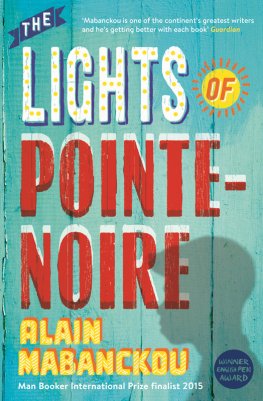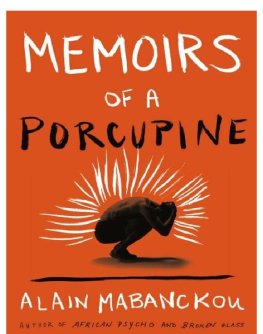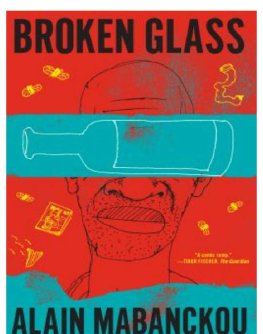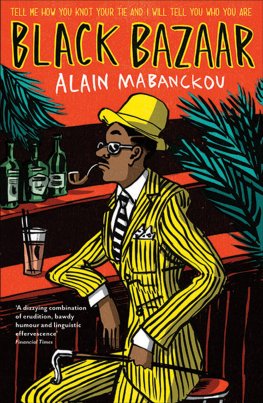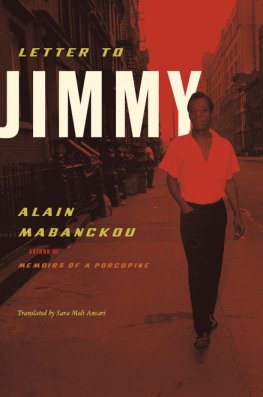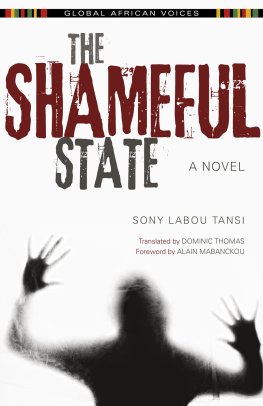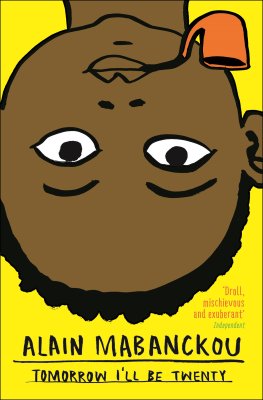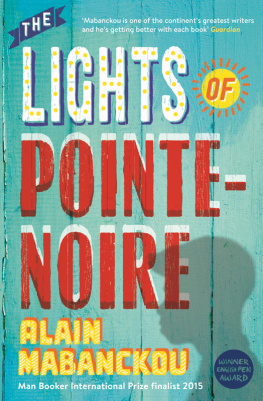Alain Mabanckou
The Lights of Pointe-Noire
Praise for Alain Mabanckou
Alain Mabanckou was born in 1966 in Congo. He currently lives in Los Angeles, where he teaches literature at UCLA. He was awarded the prestigious Grand Prix de Littrature Henri Gal for his body of work. He has also received the Subsaharan African Literature Prize for Blue-White-Red, and the Prix Renaudot for Memoirs of a Porcupine, which is published by Serpents Tail along with his other novels, Black Bazaar, Broken Glass and African Psycho.
Alain Mabanckou addresses the reader with exuberant inventiveness in novels that are brilliantly imaginative in their forms of storytelling. His voice is vividly colloquial, mischievous and often outrageous as he explores, from multiple angles, the country where he grew up, drawing on its political conflicts and compromises, disappointments and hopes. He acts the jester, but with serious intent and lacerating effect Man International Booker Prize judges citation
Africas Samuel Beckett Mabanckou is a subversive [his] freewheeling prose marries classical French elegance with Paris slang and a Congolese beat Economist
A dizzying combination of erudition, bawdy humour and linguistic effervescence Financial Times
Scorching wit and flights of eloquence vitriolic comedy and pugnacious irreverence Boyd Tonkin, Independent
A novelist of exuberant originality [Tomorrow Ill Be Twenty is a] delightful comic novel in which the boy narrators ingenuousness is teamed with a sly authorial wit its seductive charm and intelligence recentre the world Maya Jaggi, Guardian
Mabanckous novels about life in Africa have won much acclaim. Tomorrow Ill Be Twenty, a fictionalised account of his childhood in Congo-Brazzaville, is perhaps his best yet Nobel laureate JMG Le Clzio likens Mabanckou to Cline, Chinua Achebe, JD Salinger and Rjean Ducharme. Such a varied list suggests that he is, in fact, incomparable Financial Times
[African Psycho is] Taxi Driver for Africas blank generation a deftly ironic Grand Guignol, a pulp fiction vision of Frantz Fanons The Wretched of the Earth that somehow manages to be both frightening and self-mocking at the same time Time Out New York
[Memoirs of a Porcupine] subverts stereotypical notions of African literature, setting clich and shibboleths on collision course. Magical realism meets black comedy in an excellent satire by an inventive and playful writer Herald
The Lights of Pointe-Noire
Now the hours are ripening
On the go-home tree
Meanwhile a drowsy numbness
longs for eyelids
heavy with a dust of regret
a child will be born long ago
For a long time I let people think my mother was still alive. Im going to make a big effort, now, to set the record straight, to try to distance myself from this lie, which has only served to postpone my mourning. My face still bears the scars of her loss. Im good at covering them over with a coat of fake good humour, but suddenly theyll show through, my laughter breaks off and shes back in my thoughts again, the woman I never saw age, never saw die, who, in my most troubled dreams, turns her back on me, so I wont see her tears. Wherever I find myself in the world, it takes just the cry of a cat alone at night, or the barking of dogs on heat, and Ill turn my face to the stars, recalling a tale from my childhood, of the old woman we thought we could see in the moon, carrying a heavy basket on her head. We kids would point her out just with a tilt of the nose, a lift of the chin, convinced we mustnt point at her or utter the slightest sound, or wed wake next morning and find wed been struck deaf or blind, or even with elephantitis or leprosy. We knew, of course, that the miracle woman had no quarrel with children and that the dread diseases she could inflict on peeping toms were punishments reserved for adults who tried to glimpse her naked when she went for a swim up there in the river of clouds. These perverts were encouraged by a handful of charlatans who said that if you saw the old woman without her clothes on it brought blessings on your business and good luck in your everyday life. Now we never really expected things to go all that well, which is probably why we closed our eyes, lying there in the damp grass, so she wouldnt think we were after the same thing as the grown-ups. She must have had a good laugh to herself up there, reading our innermost thoughts and detecting our every movement, thanks to her perfect ear. Shed turn around, look left, look right, then vanish the second we lay down on our stomachs and pretended to be asleep. We knew she was close by, she was watching us, and maybe she too enjoyed the game, which to us was a bit like hide-and-seek.
Then shed reappear, wed see her now, side on, like a shadow puppet, wrapped in layers of dense cloud. We watched her slow progression, transfixed, as a shower of shooting stars fell from her basket, like a firework display to launch the evening drum roll across the land. At that very moment I expect a child was being born somewhere, not knowing it owed its life to this woman, bent double by her penance, but guarantor of all life here below. And at the same time, as a calm fell upon the vault of heaven and at last the moon left the sky, a handful of stars suddenly switched off like lights, as though theyd been hit by bullets from the gun of a hunter standing behind us. We looked at each other, sadly. Someone, somewhere, had died. We knelt down, chin to chest, and mumbled: May his soul rest in peace
Who was this nomad of the nights of full moon, whose face no man or woman had ever seen? Some said her story went back to a time when the Earth and the Sky were always squabbling. The Earth said the Sky was faithless and fickle, had mood swings, yelled and roared, while the Sky said the Earth was mindless and dull. God was required to judge between them, and sided with the Sky, since He lived there. And so the miracle woman laid down her life, and took upon herself the sins born of the heedlessness of man. Through this act, she averted a disaster that would have brought about the extermination of the entire human race. During the season before this sacrifice of propitiation, famine and drought on an unprecedented scale came to several villages in the southern Congo. The animals were dying off and so much of the flora vanished that even the most optimistic sorcerers began to predict, within the next quarter-year, the disappearance of the Mayombe forest and the implacable advance of the desert, in which all would perish. That year, bush meat was a distant memory. People ate anything, just to survive, and some villagers made fortunes trading lizards, lightning bugs, ants, beetles, flies and mosquitoes. Within two months these all-invading creatures had completely vanished. There was a rumour that in certain tribes, when someone died, they fought over the body to be sure of at least one whole week of food.
The destruction of our land was foretold by a blind enchantress with a rasping voice and two crippled legs, who shuffled around on her butt. She revealed that the very hands of Time would forget our district, that in the coming days they would stop at midnight, and people would wake on the morning of that terrible moment to a new order of existence: scarcity, or complete absence of water, increased incidence of mirages, sandstorms and deadly heat waves. At first no one took these predictions very seriously. Everyone just said the blind and crippled sorceress was a victim of her own delusions, how else could you explain that each night shed sell bananas, in front of her property, and though no one ever bought them, they still all disappeared? Where did she find them, when the desert had devoured over half the southern territory? She had more and more customers every day, but where did they all come from? This was in fact the start of the illusions; the sorceresss wares were the fruit of peoples imagination.

